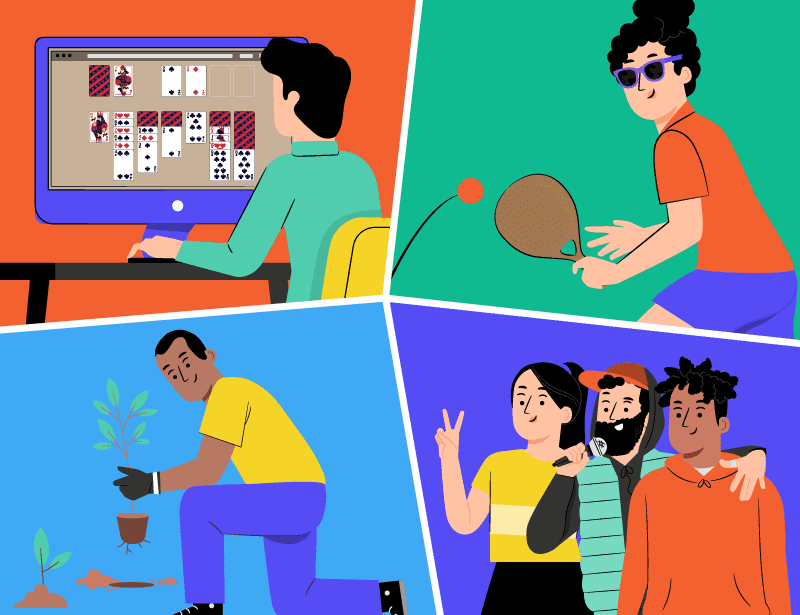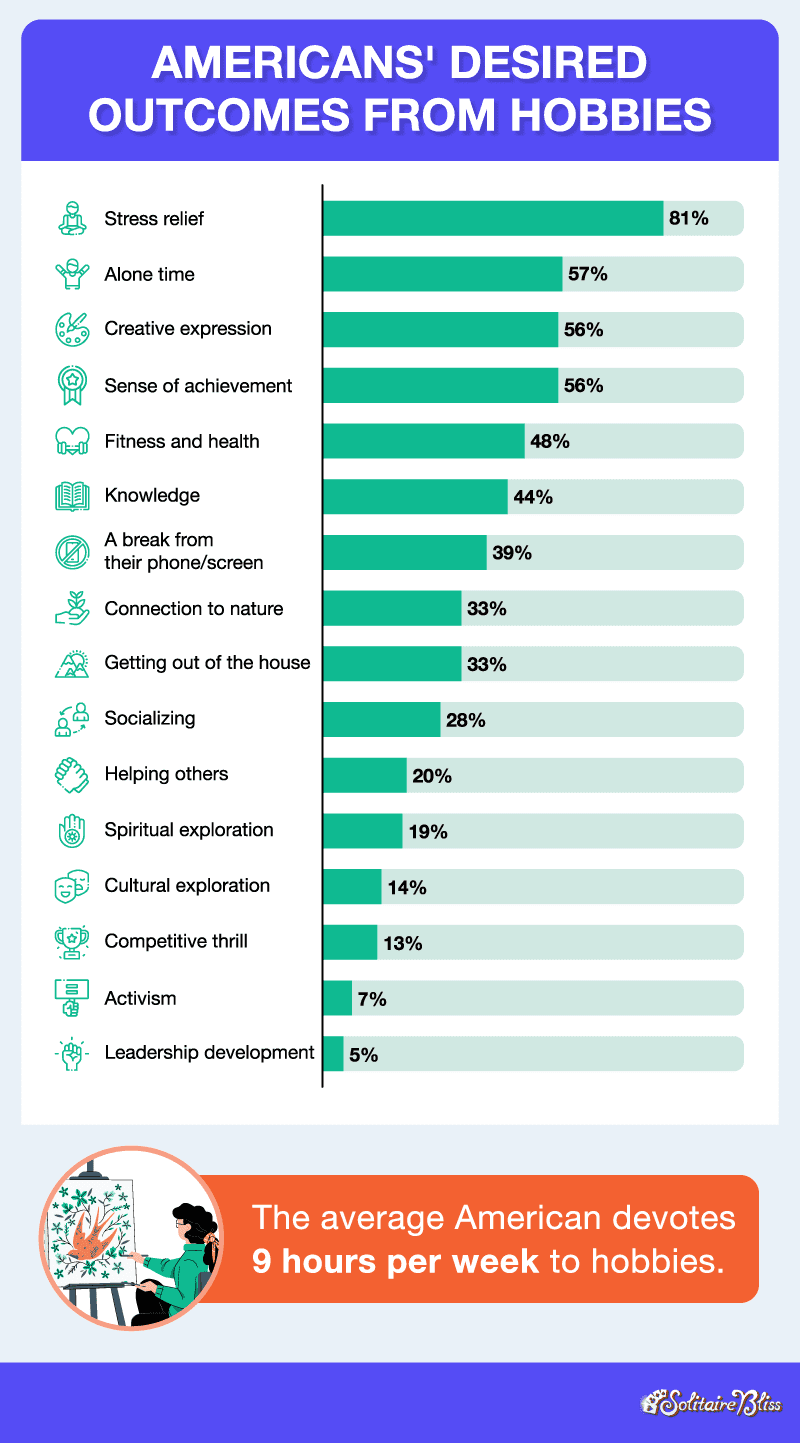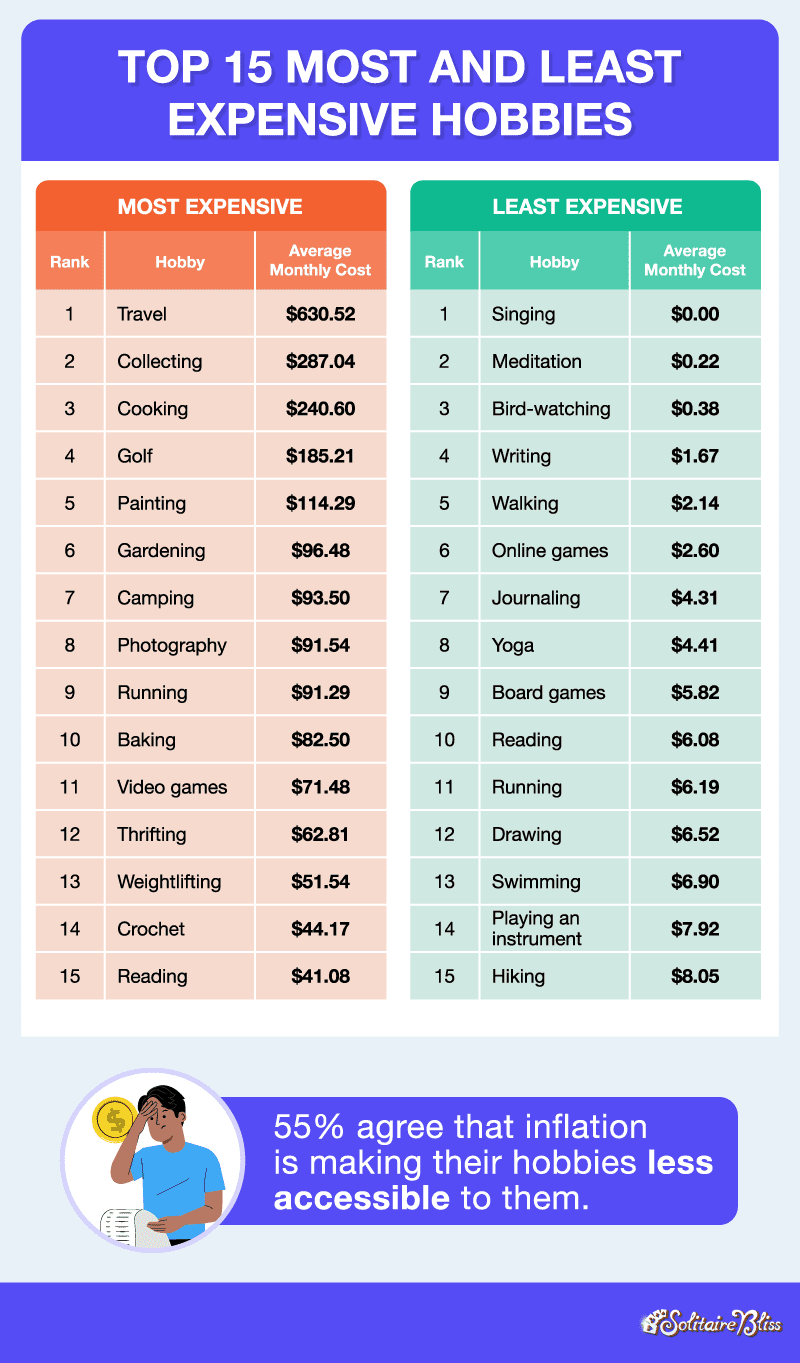These Hobbies Have the Best and Worst Bang for Your Buck in 2024

Hobbies, the heart of our leisure time, are as diverse as we are. They range from creative pursuits like painting and drawing to more sedentary activities such as reading or online Solitaire. But does indulging in our favorite hobbies mean breaking the bank?
In a pursuit to uncover the real cost of fun, we explored the spending habits of Americans on their hobbies. Are the most enjoyable hobbies also the most expensive? Or do the simplest pleasures reign supreme in providing enjoyment?
Our report reveals the hobbies that deliver the highest satisfaction per dollar spent to discover how to have a blast without blowing your budget. This post unravels the truth about the cost of leisure and explores the hobbies that truly give Americans the best bang for their buck.
Key Findings
- Stress relief is the #1 desired outcome for engaging in hobbies.
- Music production, comedy groups, and meditation have the best bang for your buck.
- Cooking and baking, car repair and maintenance, and bowling are the hobbies with the worst bang for your buck.
- The average American devotes 9 hours per week to their hobbies.
- Over half (55%) agree that inflation is making their hobbies less accessible to them.
Why Have Hobbies, Anyways?
An astounding 81% of individuals turn to their hobbies primarily for stress relief, which highlights the importance of leisure activities in managing the pressures of daily life. Additionally, 57% value hobbies as a way to enjoy some alone time, allowing them to recharge from the hustle and bustle of their routines.
But hobbies are not just about relaxation; they are also avenues for creative expression and a sense of achievement, with both aspects valued equally by 56% of the population.
The average American dedicates 9 hours per week to their hobbies, roughly equating to more than a full work day. More than just a casual pastime, hobbies represent a significant portion of our weekly routines.
And the impact of hobbies extends beyond personal time, as 91% agree that their hobbies contribute positively to fulfillment in other life areas, such as work and family. This statistic reveals a holistic benefit, where the joy and satisfaction derived from hobbies spill over into other facets of life, enhancing overall well-being and life satisfaction.

Hobbies with the Best Bang for Your Buck
To assign each hobby a happiness-to-cost ratio, we evaluated how much joy and financial investment each hobby entails. Participants rated their happiness with each hobby on a scale from "fine" to "single favorite thing to do" and assessed the cost from "little or no money" to "a ton of money."
This method was chosen to reflect the subjective nature of spending on hobbies. This way, we are able to acknowledge that the perception of value and enjoyment derived from a hobby can vary greatly from person to person.
It’s important to note that the average happiness score is 3.78 and the average cost score is 2.08. While some hobbies may soar above that average in the happiness category, for example, the cost score may also be higher than average, which deflates the overall ranking of that hobby.
The hobby that offers the best "bang for your buck" is music production with a ratio of 2.313. This means that people who participate in music production report high levels of happiness and low cost. Music production is followed by comedy groups at 2.133 and meditation at 2.110.
Interestingly, hobbies involving community engagement, like comedy groups, animal rescue groups, and team sports, rank highly. This suggests that the social aspect of these activities significantly boosts enjoyment and perceived value.
Hobbies with the Worst Bang for Your Buck
At the bottom of our list is cooking and baking, with a ratio of only 1.122, followed by car repair and maintenance (1.327), and bowling (1.462). These findings suggest that these hobbies don’t provide as much joy relative to their cost compared to other activities.
A common theme among these less cost-effective hobbies is the requirement for specialized equipment or skills. For example, hobbies like sailing and car repair demand specific tools, parts, and expertise, which can significantly increase the overall expenditure. Additionally, this higher investment might not always correlate with a proportional increase in happiness, thereby lowering their happiness-to-cost ratio.
Most and Least Expensive Hobbies Overall
Travel tops our list as the most expensive hobby, with an average monthly expenditure of $630.52. This hobby is followed by collecting, which costs $287.04 per month, and cooking, with an average monthly expense of $240.60. These hobbies typically involve significant outlays for materials, experiences, or equipment, explaining their higher cost.
On the other end of the spectrum, singing is the most budget-friendly, with virtually no associated monthly costs ($0.00). Singing is closely followed by meditation, which could cost as little as $0.22 per month, and bird-watching at $0.38.
The cost of the same hobby can vary significantly from person to person. For example, hobbies like reading and running, which appear on both lists below, can be virtually cost-free for some, yet they may entail substantial expenses for others. This likely depends on factors like the choice of materials and the level of engagement.

Economic Inflation Is Making Hobbies Less Accessible
Our findings reveal that over half of Americans (55%) feel that inflation is impacting their ability to engage in their hobbies. This economic factor is making hobbies less accessible, especially for certain demographic groups. Gen Z, the youngest adult demographic, is feeling the brunt of this impact, with 62% stating that inflation is affecting their hobby participation. This sentiment is closely followed by millennials (60%), Gen X (53%), and boomers (41%).
In response to the increasing costs, 3 in 10 say they will have to abandon their favorite hobby if it becomes more expensive. This decision reflects the financial constraints that individuals face when pursuing their interests.
Despite these challenges, there is a strong willingness among most people to continue investing in their hobbies, even if the costs are higher than desired. The majority (55%) admit that their hobbies cost more than they’d like, but their passion for these activities drives them to participate regardless. Offering more than entertainment, hobbies can become an essential aspect of one’s identity and happiness.
Consider Solitaire Bliss as Your New Inexpensive Hobby
It’s clear that the value of a hobby extends beyond its price tag. From the intricate folds of origami to the strategic moves in a game of online Solitaire, these activities offer more than just a way to pass time; they provide a crucial outlet for relaxation, creativity, and personal fulfillment.
If you're in search of a budget-friendly hobby, consider engaging in free online games like Canfield Solitaire or Yukon Solitaire. Not only do such activities require minimal financial investment, but they also effectively fulfill the top reasons people turn to hobbies: stress relief and the need for some quality alone time.
Ultimately, the true worth of a hobby is measured not in dollars but in the joy and satisfaction it brings. Whether it’s a passion as grand as traveling or as simple as meditating, investing in a hobby is, at its core, an investment in your personal well-being.
Methodology: On December 20, 2023, We surveyed 1,007 Americans about how happy their hobbies make them and how much they spend. Respondents ranged in age from 18 to 76 years old, and were 49% female, 50% male, and 1% nonbinary.
Back to the Homepage

